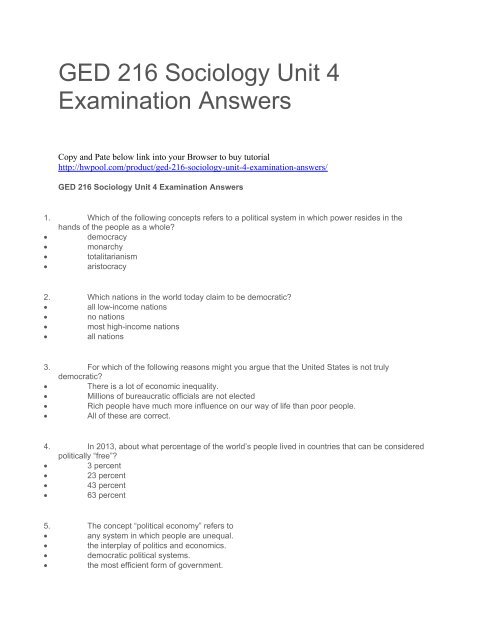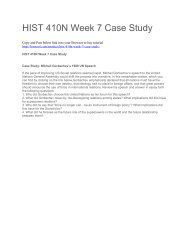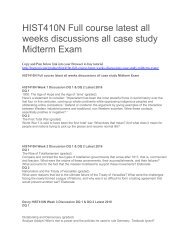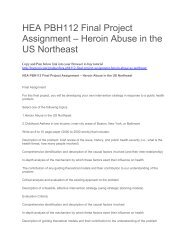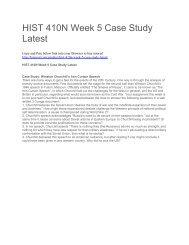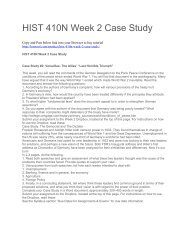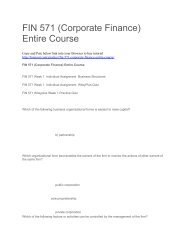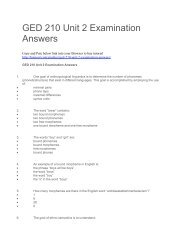GED 216 Sociology Unit 4 Examination Answers
Create successful ePaper yourself
Turn your PDF publications into a flip-book with our unique Google optimized e-Paper software.
<strong>GED</strong> <strong>216</strong> <strong>Sociology</strong> <strong>Unit</strong> 4<br />
<strong>Examination</strong> <strong>Answers</strong><br />
Copy and Pate below link into your Browser to buy tutorial<br />
http://hwpool.com/product/ged-<strong>216</strong>-sociology-unit-4-examination-answers/<br />
<strong>GED</strong> <strong>216</strong> <strong>Sociology</strong> <strong>Unit</strong> 4 <strong>Examination</strong> <strong>Answers</strong><br />
1. Which of the following concepts refers to a political system in which power resides in the<br />
hands of the people as a whole?<br />
democracy<br />
monarchy<br />
totalitarianism<br />
aristocracy<br />
2. Which nations in the world today claim to be democratic?<br />
all low-income nations<br />
no nations<br />
most high-income nations<br />
all nations<br />
3. For which of the following reasons might you argue that the <strong>Unit</strong>ed States is not truly<br />
democratic?<br />
There is a lot of economic inequality.<br />
Millions of bureaucratic officials are not elected<br />
Rich people have much more influence on our way of life than poor people.<br />
All of these are correct.<br />
4. In 2013, about what percentage of the world’s people lived in countries that can be considered<br />
politically “free”?<br />
3 percent<br />
23 percent<br />
43 percent<br />
63 percent<br />
5. The concept “political economy” refers to<br />
any system in which people are unequal.<br />
the interplay of politics and economics.<br />
democratic political systems.<br />
the most efficient form of government.
6. Capitalist societies base their claim to democracy on<br />
people having personal liberty.<br />
meeting the basic needs of all.<br />
maintaining public order.<br />
their high living standards.<br />
7. Socialist societies base their claim to democracy on<br />
people having personal liberty.<br />
meeting the basic needs of all.<br />
maintaining public order.<br />
their high living standards.<br />
8. The concept “authoritarian” refers to a political system that<br />
is well legitimate<br />
relies on more than one kind of authority.<br />
denies most people participation in government.<br />
has free elections.<br />
9. A totalitarian political system<br />
mixes politics with religion.<br />
is completely democratic<br />
is government without any bureaucracy.<br />
concentrates power and closely regulates people’s lives.<br />
10. Which of the following nations comes closest to having a political system that is “totalitarian”?<br />
Mexico<br />
France<br />
North Korea<br />
Japan<br />
11. Which of the following statements correctly describes how the U.S. population falls on the<br />
political spectrum?<br />
About 36 percent of people are moderates who fall near the political center.<br />
About 16 percent fall on the political left.<br />
About 46 percent fall on the political right.<br />
About 26 percent claim to have no political opinions at all.<br />
12. Which from the following list would be described as an economic issue?<br />
the abortion controversy<br />
poverty<br />
gay rights<br />
the family values debate<br />
13. Typically, industrial societies make use of which of the following systems to trace ancestry?<br />
bilateral descent
matrilineal descent<br />
patrilineal descent<br />
neolocality<br />
14. Matrilineal descent is typically found in which type of societies?<br />
hunting and gathering, where women gather vegetation<br />
horticultural, where women are the main food producers<br />
industrial, where women enter the workplace<br />
All of these responses are correct.<br />
15. To which region of the world would you travel if you wanted to visit many countries where the<br />
law permits polygamy?<br />
Africa<br />
North America<br />
South America<br />
Scandinavia<br />
16. According to the structural-functional approach, which of the following is counted among the<br />
tasks of the family?<br />
socialization of the young<br />
regulation of sexual activity<br />
social placement<br />
All of these responses are correct.<br />
17. The incest taboo<br />
exists only in industrial societies.<br />
is found in all societies.<br />
is found among all living species.<br />
is defined the same way in all societies.<br />
18. Following structural-functional theory, the family<br />
operates to perpetuate social inequality.<br />
is important enough to be called the backbone of society.<br />
encourages patriarchy.<br />
All of these responses are correct.<br />
19. A social-exchange analysis of family life is likely to consider<br />
how families keep society as a whole operating.<br />
how families perpetuate social inequality.<br />
how individuals select partners who offer about as much as they do to the relationship.<br />
how families regulate sexual activity.<br />
20. Social conflict and feminist theories explain that families perpetuate social inequality in U.S.<br />
society through<br />
inheritance of private property.
encouraging patriarchy.<br />
passing on racial and ethnic inequality.<br />
All of these responses are correct.<br />
21. In traditional regions of many lower-income countries, such as Sri Lanka, marriage<br />
has little to do with romantic love.<br />
is unknown.<br />
is delayed until the people reach their thirties.<br />
almost always ends in divorce.<br />
22. The concept “homogamy” means that<br />
people marry because they benefit from being married<br />
women usually marry older men.<br />
people marry others who are socially like themselves.<br />
most marriages are based on romantic love.<br />
23. In the <strong>Unit</strong>ed States, romantic love<br />
is the reason most people expect to marry.<br />
is not a very stable foundation for marriage.<br />
may contribute to a high divorce rate.<br />
All of these responses are correct.<br />
24. Supporters of liberation theology hope that this social movement will achieve which of the<br />
following goals?<br />
keeping politics out of the church<br />
helping people endure their suffering<br />
encouraging personal growth<br />
reducing social inequality and, especially, poverty<br />
25. A religious organization that is well integrated into the larger society is called a<br />
church<br />
sect<br />
cult<br />
denomination


